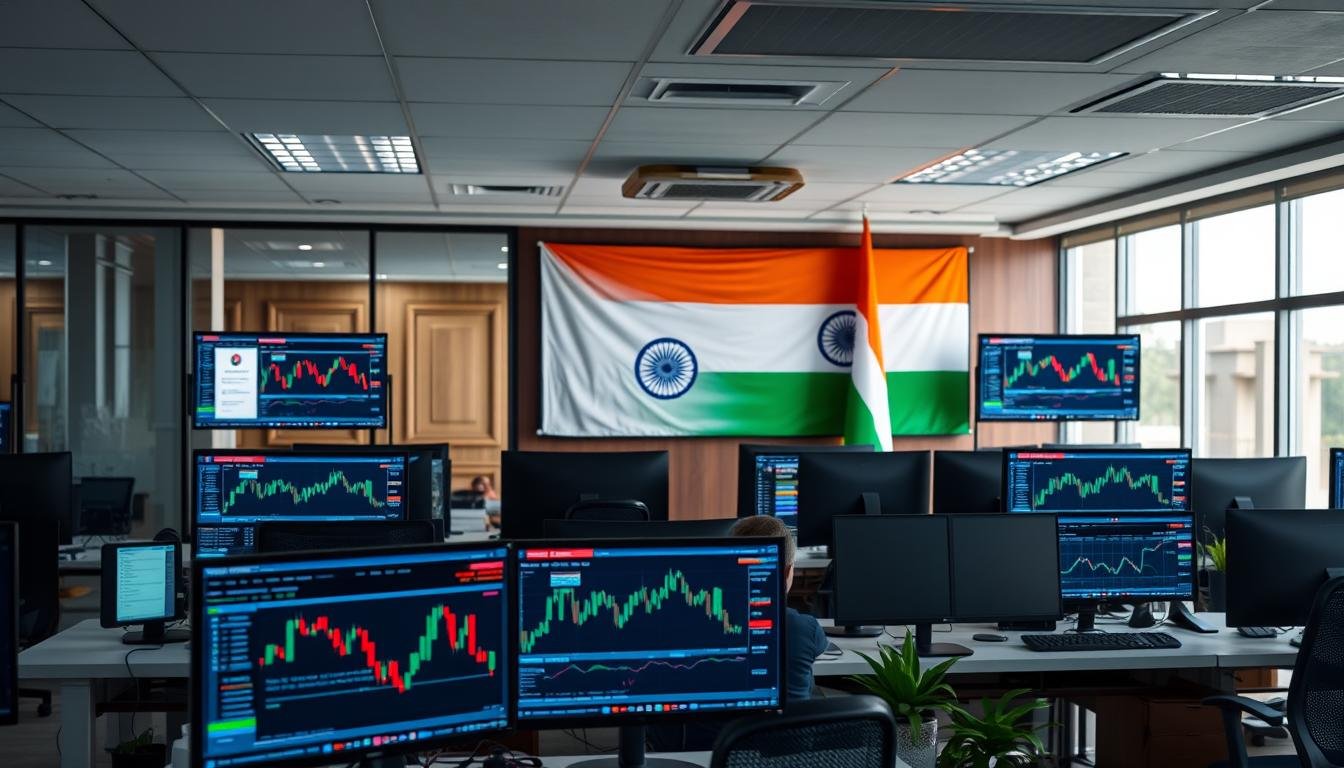Top Regulated Forex Brokers in India | Trusted Options
The Indian forex market is growing fast. More traders are looking for reliable and regulated brokers. This article looks at the best regulated forex brokers in India. It covers the rules, licenses, and what Indian traders should know for a safe trading experience.
Key Takeaways
- Understand the importance of forex market regulation for Indian traders
- Explore the top regulated forex brokers in India and their offerings
- Learn about the regulatory bodies and licenses governing the Indian forex market
- Discover the benefits of trading with regulated forex brokers in India
- Gain insights into the process of selecting a compliant and trustworthy forex broker
What is Forex Trading and Why is Regulation Important?
Forex, or the foreign exchange market, is the biggest and most liquid financial market. It’s where currencies from different countries are traded. Traders buy and sell currencies to make money from changes in their value.
This market is always moving, thanks to the global economy. It gives traders a chance to profit from these changes.
Understanding the Forex Market
The forex market never stops, running 24/7, 5 days a week. It’s a place where traders buy and sell currencies all day and night. Unlike other markets, it doesn’t have a central location.
Instead, trades happen online between traders and big financial players like banks and brokerages.
The Role of Regulation in Forex Trading
Regulation is key in the forex market. It keeps the market fair and safe. Forex trading regulations in India protect traders and keep things honest.
Groups like the Reserve Bank of India (RBI) and the Securities and Exchange Board of India (SEBI) watch over forex broker compliance in India. They make sure legitimate forex brokers for Indian traders follow the rules.
Brokers must be open and protect their customers. They also have to manage risks well. This makes the Indian forex market trustworthy for everyone.
“Regulation is essential in the forex market to safeguard investors and ensure the stability of the financial system as a whole.”
Forex Trading Regulations in India
The forex trading in India is guided by strict rules. The Reserve Bank of India (RBI) is in charge. It makes sure the forex market is safe and stable.
RBI’s Guidelines for Forex Brokers
The RBI has clear rules for forex brokers in India. These rules help protect investors and keep the market open. Some important RBI rules include:
- Mandatory registration and licensing of forex brokers
- Stringent capital requirements for brokers to ensure financial stability
- Strict adherence to know-your-customer (KYC) and anti-money laundering (AML) policies
- Robust risk management protocols to mitigate market volatility
- Compliance with reporting and record-keeping obligations
The Securities and Exchange Board of India (SEBI) also helps regulate sebi regulated forex brokers. It ensures investors are safe and trading is fair.
By following RBI’s rules and SEBI’s regulations, forex brokers in India show they care about their investors. This oversight keeps the forex regulations by rbi india stable and trustworthy.
Top Regulated Forex Brokers in India
Forex trading in India is best done with regulated brokers. These brokers follow strict rules from the RBI and SEBI. This makes trading safe and reliable.
Here are some top forex brokers in India that traders trust:
- Fidelity Investments India
- ICICI Direct
- Kotak Securities
- Axis Direct
- Sharekhan by BNP Paribas
| Broker | Regulation | Services |
|---|---|---|
| Fidelity Investments India | RBI, SEBI | Forex trading, CFDs, Commodities |
| ICICI Direct | RBI, SEBI | Forex trading, Stocks, Mutual Funds |
| Kotak Securities | RBI, SEBI | Forex trading, Equity, Derivatives |
| Axis Direct | RBI, SEBI | Forex trading, Stocks, Mutual Funds |
| Sharekhan by BNP Paribas | RBI, SEBI | Forex trading, Stocks, Mutual Funds |
These regulated forex brokers in India provide many trading options. They also have good prices and strong security. This means your money and personal info are safe.
Benefits of Trading with Regulated Forex Brokers
Trading with a regulated broker is key in forex. Forex brokers in India who are regulated offer many benefits. They ensure a safer and clearer trading experience for investors in India.
Investor Protection
One big plus of regulated legitimate forex brokers for indian traders is strong investor protection. They follow strict rules from bodies like the Reserve Bank of India (RBI). This means they are fair and open in their dealings. Your money is safe, kept in secure accounts.
Transparency and Fair Practices
Regulated forex broker compliance in india must follow strict rules. They are open about their trading, finances, and how they talk to clients. This openness helps you make better choices, knowing all about your trades.
- Reliable and accurate reporting of trading activity and account statements
- Clearly stated fees, commissions, and other charges
- Adherence to fair and ethical trading practices
Choosing a regulated forex broker in India means your trading is safe. You can trust them to look out for your interests. This trust is vital in the fast-changing world of forex trading.
How to Choose a Regulated Forex Broker in India
Choosing a regulated forex broker in India is key for safe trading. Let’s look at what to consider when picking a broker.
Check for Licenses and Registrations
First, check if the broker has the right licenses and registrations. Good brokers in India are registered with the Securities and Exchange Board of India (SEBI). This means they follow strict rules, keeping your money safe.
Look for brokers who show their forex broker licenses in India and SEBI registration clearly on their site. This shows they follow the rules and are open about it.
- Verify the broker’s SEBI registration number and ensure it is valid and up-to-date.
- Check if the broker is a SEBI-regulated forex broker, as this is a mark of quality and trustworthiness.
- Ensure the broker’s licenses and registrations cover the specific services they offer, such as currency trading, CFDs, or other financial instruments.
Choosing a SEBI regulated forex broker means you can trust them to follow the rules and protect your money.
“Partnering with a regulated forex broker in India is the first step towards a secure and rewarding trading experience.”
Remember, being regulated is more than just a formality. It shows the broker is serious about being fair and open. By choosing regulated brokers, you can trade in India with confidence and without worry.
Forex Broker Licenses in India
The forex trading industry in India relies heavily on regulatory oversight. The Securities and Exchange Board of India (SEBI) ensures the market’s integrity and stability. SEBI issues and oversees the licenses and registrations for forex brokers to operate legally.
SEBI Regulation
Forex brokers in India must follow SEBI’s strict guidelines to get licenses and registrations. They must meet financial, operational, and compliance standards to protect investors. Here are some key SEBI regulations for forex brokers:
- Registered as a SEBI-regulated forex broker to offer forex trading services to Indian clients
- Maintain a minimum net worth of INR 50 crores (approximately $6.8 million) to operate as a forex broker
- Implement robust risk management practices and compliance measures to safeguard client funds and data
- Provide transparent and fair pricing, with no hidden commissions or fees
- Adhere to strict Know Your Customer (KYC) and Anti-Money Laundering (AML) guidelines
SEBI’s goal is to create a secure and trustworthy environment for traders. This confidence is built on SEBI-regulated forex brokers and the overall market.

“Regulation is the key to a stable and transparent forex market, and SEBI plays a vital role in upholding these standards in India.”
Indian Forex Market Rules and Authorized Forex Dealers
Understanding the Indian forex market can be tricky. But knowing the rules is key for traders. The Reserve Bank of India (RBI) oversees the market and sets guidelines for dealers.
Dealers must follow RBI rules to operate. These dealers are banks and money changers with RBI permission. The RBI updates the list of authorized dealers to keep the market safe.
| Category | Authorized Forex Dealers in India |
|---|---|
| Banks | State Bank of India, HDFC Bank, ICICI Bank, Axis Bank, Kotak Mahindra Bank, and many more |
| Money Changers | Thomas Cook, Forex Plus, Centrum Direct, and other RBI-licensed money changers |
The RBI also limits how much foreign currency can be bought or sold. These limits help prevent too much speculation and keep the market stable.
By following indian forex market rules and working with authorized forex dealers in india, traders can stay legal and avoid risks.
Regulated Forex Brokers in India: Your Gateway to Safe Trading
Choosing a regulated broker is key for safe trading in the forex market. India’s forex market is growing fast, attracting both new and experienced traders. But, it’s important to pick reputable and compliant brokers.
Regulated forex brokers in India offer secure and reliable trading. They follow rules set by the Reserve Bank of India (RBI) and other bodies. This gives traders the confidence they need to trade in the forex market.
- Regulated brokers follow strict rules to protect client funds and keep their operations transparent.
- They must meet high compliance standards, including regular audits and reports. This builds trust with traders.
- Working with a regulated broker means your transactions and personal data are safe. This reduces the risk of fraud or manipulation.
Finding the right forex broker in India can be tough. But, by choosing regulated options, traders can fully explore the forex market. Spending time to find the top regulated forex brokers in India can be a big advantage. It provides a safe and compliant place for trading.
“Choosing a regulated forex broker is not just a matter of compliance; it’s a strategic decision that can make all the difference in your trading journey.”
The forex market is always changing, and regulated brokers in India are more important than ever. By working with these trusted brokers, traders can start their forex trading journey with confidence. They know their assets and personal information are safe.
Legal Forex Brokers in India: Ensuring Compliance
In the world of forex trading, it’s key to work with legal brokers in India. These brokers offer a safe space for traders to explore the foreign exchange markets.
Legal forex brokers must follow Indian laws closely. They need to meet the rules of the Reserve Bank of India (RBI) and the Securities and Exchange Board of India (SEBI). These bodies oversee the forex industry in India.
Choosing legal forex brokers in India means your money and personal info are safe. Your trades are also clear and honest. Forex broker compliance in India shows a broker’s promise to offer a reliable trading experience.
- Legal forex brokers in India must get the right licenses to operate.
- They have to keep detailed records and follow strict rules for transparency.
- They also have to protect client funds, fight money laundering, and manage risks well.
Trading with a legal and compliant broker in India gives you peace of mind. You know your money and personal info are safe. Your trades are also legal.
“Compliance is not just a box to be ticked, but a testament to a broker’s dedication to providing a safe and trustworthy trading environment for their clients.”
As the Indian forex market grows, it’s important to choose legal forex brokers in India who follow the rules well. This way, you can trade confidently and protect your money.

Sebi Regulated Forex Brokers: A Trusted Option
Choosing a reputable forex broker in India is crucial. SEBI regulated forex brokers are among the most trusted. They are closely watched by the Securities and Exchange Board of India (SEBI), the top financial regulator in India.
Trading with a SEBI regulated broker offers great investor protection. SEBI’s rules make sure these brokers are transparent, fair, and keep client funds separate. This means traders can trust their investments are safe.
SEBI regulated forex brokers must follow all Indian forex market laws. They need the right forex broker licenses in India. This makes them even more reliable and trustworthy.
Choosing a SEBI regulated broker means your trades are secure and regulated. This is especially important for Indian traders wanting to join the global forex market. They can do so knowing their investments are protected.
In summary, SEBI regulated forex brokers are a safe choice for Indian traders. They value safety, transparency, and following the rules. By working with these brokers, investors can trade the forex market confidently, knowing their interests are protected by SEBI.
Forex Broker Compliance in India: A Comprehensive Guide
The forex market in India is growing fast. It’s more important than ever to work with regulated brokers. Forex broker compliance in India is complex. It involves many rules, best practices, and things to consider for traders. This guide will help you understand forex broker compliance better. It will aid in making smart choices when picking a broker.
At the heart of forex broker compliance in India are rules from the Securities and Exchange Board of India (SEBI) and the Reserve Bank of India (RBI). SEBI regulated forex brokers must follow strict rules. These rules ensure they are fair, transparent, and protect investors.
| Key Compliance Requirements for Forex Brokers in India | Importance |
|---|---|
| Proper licensing and registration | Ensures the broker is authorized to operate and adhere to regulatory standards |
| Maintaining adequate capital requirements | Demonstrates financial stability and ability to support client trading activities |
| Implementing robust risk management practices | Protects traders from excessive risk exposure and market volatility |
| Providing transparent and accurate client reporting | Builds trust and accountability in the broker-client relationship |
| Adhering to Anti-Money Laundering (AML) and Know-Your-Customer (KYC) protocols | Ensures the integrity of the trading platform and prevents financial crimes |
Understanding forex broker compliance in India helps traders make better choices. They can pick brokers that follow strict rules and protect clients. This creates a safer and more trustworthy trading space. It helps traders have successful and lasting forex trading experiences.
“Compliance is not just a box to be checked, but a fundamental pillar of a successful and trusted forex trading ecosystem.”
Legitimate Forex Brokers for Indian Traders: Making the Right Choice
In the world of forex trading, finding the right broker is key for Indian traders. There are many options, making it hard to choose. But, by looking at regulatory compliance, reputation, and transparency, traders can find the best brokers for their needs.
Regulatory Compliance: The Foundation of Trust
Being regulated by the RBI and SEBI is a sign of a good broker. Traders should check if their broker is licensed. This means the broker follows rules, protects investors, and meets industry standards.
Reputation and Track Record: Indicators of Reliability
Good brokers have a solid reputation and a track record of reliable service. Looking at a broker’s history, client feedback, and awards can help find the best ones.
Transparency and Client-Centric Practices
Good brokers are open and honest about their services and fees. They also focus on their clients, offering quick account setup, fast order execution, and good customer support.
By focusing on these points, Indian traders can find reliable brokers. This makes trading safer and more trustworthy. Taking the time to research brokers is crucial for a successful trading experience.
“Selecting a legitimate forex broker is essential for Indian traders to ensure the safety of their investments and the integrity of their trading activities.”
| Criteria | Explanation |
|---|---|
| Regulatory Compliance | Brokers should be licensed and regulated by financial authorities like RBI and SEBI, ensuring investor protection and adherence to industry standards. |
| Reputation and Track Record | Established brokers with a proven history of reliable services, efficient execution, and client satisfaction are preferred. |
| Transparency and Client-Centric Practices | Brokers should offer clear information, efficient account management, and responsive customer support. |
By focusing on these factors, Indian traders can confidently navigate the forex market and choose legitimate brokers that will provide a secure and trustworthy trading experience.
Forex Regulations by RBI India: Navigating the Landscape
The Reserve Bank of India (RBI) is key in the fast-changing Indian forex market. As the central bank, it guides forex brokers and traders. This ensures the market is stable, clear, and follows the rules.
The RBI watches over many parts of the forex market. This includes forex regulations by rbi india and the wider indian forex market rules. These rules help protect investors, encourage fair play, and keep the trading system strong.
Comprehensive Regulatory Framework
The RBI has a detailed set of rules for the forex market. Some important parts are:
- Licensing and registration rules for forex brokers
- Rules on what forex transactions and instruments are allowed
- Rules for reporting and keeping records of forex deals
- Steps to stop money laundering and funding terrorism
- Rules to protect investors and solve disputes
By following these rules, forex brokers in India show they are serious about working in a safe and clear environment. This builds trust with traders.
“The RBI’s forex regulations are designed to foster a fair and efficient forex market, safeguarding the interests of both brokers and traders.”
It can be hard to understand forex regulations by rbi india and indian forex market rules. But knowing the RBI’s role and the rules is key for traders. It helps them make smart choices and trade with confidence.
It’s important for forex brokers and traders to keep up with RBI’s latest rules. They need to adapt to changes in the market to do well in India.
Regulated Forex Brokers in India: Top Picks for Secure Trading
Looking for a forex broker in India? It’s key to find one that’s regulated and trustworthy. The Indian market has many top brokers that offer a safe place to trade. Let’s look at some of the best regulated forex brokers in India for your trading needs.
FxPro is a leading broker in India. It’s regulated by the Securities and Exchange Board of India (SEBI). FxPro has a wide range of trading tools, competitive spreads, and an easy-to-use platform. Their focus on transparency and protecting clients makes them a favorite among traders.
FXTM is another top broker in India. It’s regulated by the Reserve Bank of India (RBI). FXTM offers a safe trading experience, following strict rules. They have many trading options, educational resources, and great customer support, making them a reliable choice for traders.
- InstaForex: Regulated by the SEBI, InstaForex is known for its innovative trading technologies, fast execution, and reliable customer service. They offer a wide range of trading instruments and competitive trading conditions.
- Saxo Bank: As a SEBI-regulated broker, Saxo Bank offers a sophisticated trading platform, extensive market analysis, and a commitment to client protection. Their advanced trading tools and research capabilities make them a popular choice among sophisticated investors.
- Tickmill: Regulated by the RBI, Tickmill provides a secure and transparent trading environment with tight spreads, fast execution, and a user-friendly platform. Their focus on compliance and client satisfaction has earned them a strong reputation in the Indian forex market.
When picking a forex broker in India, look for regulatory compliance, good trading conditions, platform features, and customer support. Choosing a reputable and legal forex broker in India ensures a safe and reliable trading experience. This gives you confidence to trade in the dynamic forex market.
“Choosing a regulated forex broker is the first step towards secure and compliant trading in the Indian market.”
Conclusion
In this guide, we’ve looked at why regulated forex brokers in India are so important. They make sure trading is safe and follows the rules. The RBI and SEBI have set up rules to protect traders and keep the market honest.
Choosing a licensed broker means your money is safe, and your trades are clear. This builds trust and helps you succeed in the fast-paced forex world.
Starting your forex trading journey? Look for a regulated broker in India that fits your needs. This way, you can trade with confidence, using the help and security of trusted financial experts.
FAQ
What is the regulatory landscape for forex trading in India?
In India, forex trading is overseen by the Reserve Bank of India (RBI) and the Securities and Exchange Board of India (SEBI). RBI guides forex brokers. SEBI licenses and checks if brokers follow the rules.
What are the key requirements for forex brokers to operate legally in India?
Forex brokers need licenses from RBI and SEBI to work in India. They must get a currency dealer license from RBI and register as an authorized dealer. They also have to follow RBI and SEBI’s rules.
How can I identify a regulated and legitimate forex broker in India?
Look for a broker’s licenses and registrations with RBI and SEBI. Good brokers show their licenses on their website. You can also check with RBI and SEBI.
What are the benefits of trading with a regulated forex broker in India?
Trading with a regulated broker in India is safe. It offers protection for investors and fair trading practices. Brokers follow Indian laws, making trading secure and trustworthy.
How does the RBI regulate the forex market in India?
RBI controls the forex market in India. It sets rules for brokers, like getting a license and following AML and KYC policies. This ensures brokers operate fairly.
What is the role of SEBI in the regulation of forex brokers in India?
SEBI is key in regulating forex brokers in India. It licenses and registers brokers, ensuring they meet rules. SEBI brokers are known for their high standards and protection of investors.
What are the legal requirements for forex brokers to operate in the Indian market?
Brokers need a currency dealer license from RBI and must register as authorized dealers. They must follow RBI and SEBI’s rules, like keeping enough capital and following KYC and AML policies. They also have to trade fairly.




